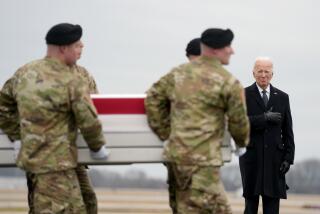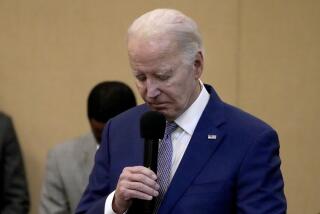Jordan Looks to Syria for Oil Supplies
- Share via
AMMAN, Jordan — War and politics brought restrictions to Jordanian motorists Tuesday and sent officials to Syria looking for new supplies of oil.
Allied bombing of Iraqi highways has severely limited Amman’s primary source of fuel and ignited a political dispute between Jordan and the United States.
For the second time in six days, U.S. Ambassador Roger Harrison was summoned to explain the American position on air raids that, according to government officials here, have killed six drivers and destroyed up to 30 Jordanian oil trucks and private cars in Iraq since the Gulf War began.
In a briefing with Western reporters, Information Minister Ibrahim Izzeddine said that relations between Amman and Washington have soured sharply over the issue.
Since September, when Saudi Arabia shut down a pipeline that supplied the majority of Jordan’s oil in transparent punishment for Jordan’s position on the war, the country has been dependent on Iraqi supplies. Izzeddine and other officials say that oil was trucked in from Iraq under an unwritten exclusion to the U.N. economic embargo against Baghdad. The Iraqis supplied the crude oil at favorable prices, deducted from Baghdad’s foreign debt to Amman.
Izzeddine said that negotiations were under way Tuesday with the Syrian government to replace the lost supplies and that Jordan may have to import other foreign crude at world prices through the southern port of Aqaba. Press reports from Damascus said the Jordanian delegation was headed by Mohammed Safadi, a top executive of the big Jordanian refinery at Zarqa, northeast of Amman.
“We have to take it (Syrian oil) because it is the best alternative for the time being,” the information minister said. “But we hope to continue importing from Iraq, actually.”
The Jordanian government has declared itself neutral in the Persian Gulf War, but public opinion favors Iraq. Syria, which has become a minor oil exporter in the past three years, is a member of the American-led military coalition deployed in Saudi Arabia.
Meanwhile, despite Izzeddine’s assertion that Jordan’s oil reserves are sufficient “for months,” Jordanian motorists submitted to a government program under which only cars with odd-numbered license plates may take to the roads on odd-numbered days, and even plates on even days.
The Transport Ministry said that violators’ cars will be impounded, and in recent days a number of two-car Jordanian families said they are making temporary trades so each family will have one odd-plated car and one even.
To further restrict fuel usage, the government announced that the use of official vehicles will be cut by half and heating in government buildings will be reduced by 25%.
The political fallout from the allied bombing began last Wednesday when Foreign Minister Taher Masri told Parliament that four Jordanian drivers had been killed in air raids on Iraqi roads and nine Jordanian tanker-trucks and several civilian cars had been destroyed.
Masri presented an official protest to Ambassador Harrison and angrily told the Jordanian lawmakers: “We have an agreement with the U.N. that excludes our oil imports from Iraq. If this (attack) was intended to make us change our position (on the conflict), it will not do. We will keep to our principles.” He said he had told Harrison that the air raids constituted an “outrageous aggression on Jordanian civilians and their property.” U.N. Secretary General Javier Perez de Cuellar called Jordan an “innocent victim.”
The dispute deepened over the last week as Jordanian officials complained that they were getting mixed signals from Washington press briefings by State Department spokeswoman Margaret Tutwiler and allied military briefing officers in Saudi Arabia.
Tutwiler was quoted as saying Friday that Washington considered Jordan oil imports from Iraq a “clear violation” of the U.N. embargo and that Jordanian drivers traveled Iraqi highways at their own risk. On Monday, press reports from Washington quoted the spokeswoman as saying, “Moreover, we have credible information that war materiel, including some related to Scud missiles, has been transported in convoy with civilian oil trucks.”
She said that American planes were not targeting Jordanian tanker-trucks but that any tankers in convoy with suspect vehicles were taking a risk.
Izzeddine, the information minister, said tanker drivers are under orders not to travel in convoy and to move on the Iraqi roads only in daylight. “I think we’re are going to see some clarifications from the American Administration,” he said, apparently alluding to the second summons to the U.S. ambassador here. He added, “We can deny categorically that our nationals involve themselves in any military activity in Iraq.”
On the streets of Amman, however, clarifications meant little in the anger over the deaths of Jordanian drivers.
More to Read
Sign up for Essential California
The most important California stories and recommendations in your inbox every morning.
You may occasionally receive promotional content from the Los Angeles Times.













